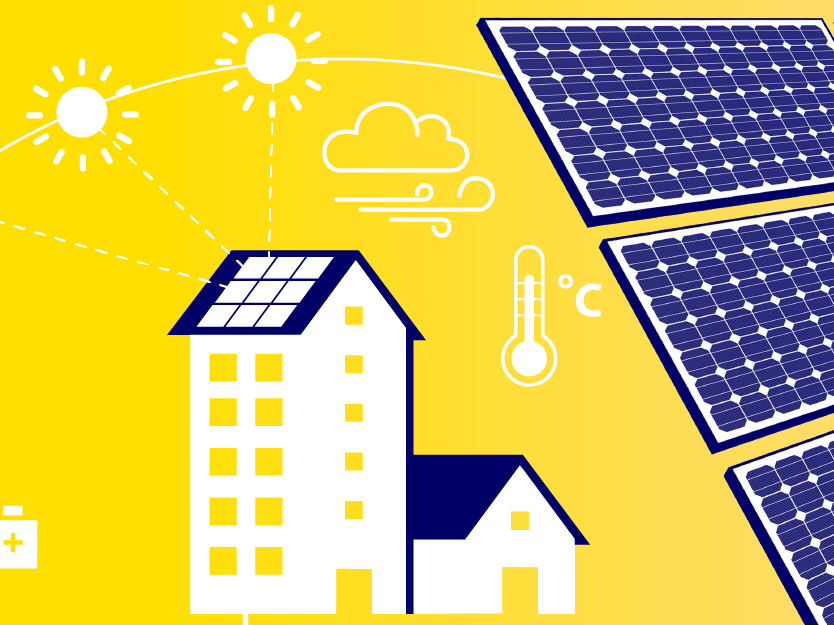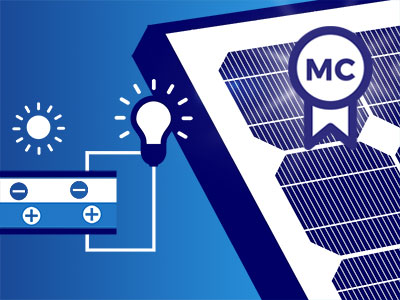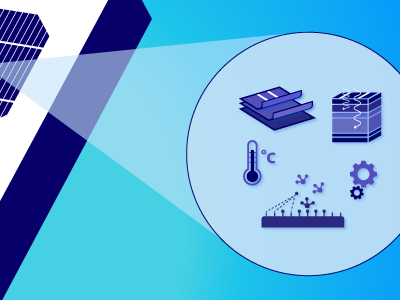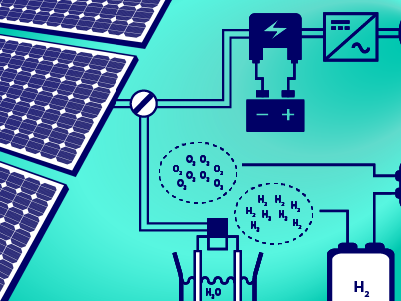Overview
Note: This course can be started at any time from 4 September 2024 until 8 December 2024, and it will be closed for all participants on 18 December 2024. Please note that all assignments should be submitted before the end date in order to obtain the certificate.
Learn to examine manufacturing aspects, optimize your processes and workflows and find ways to refine and improve solar cell architectures.
The efficiency of commonly deployed PV components is rapidly approaching its technological limits. Therefore, future developments will depend on skilled modeling engineers who are well versed in the use of advanced and novel materials, interface engineering and device architectures.
This course aims to equip participants with these essential skills. It will deepen your understanding and use of tools and methods to accurately characterize and model the performance of photovoltaic materials and devices. You will learn to examine manufacturing aspects, optimize your processes and workflows and find ways to refine and improve solar cell architectures. With these new skills and knowledge, you will be able to improve processes, throughput and efficiency throughout your organization and to optimize current and future devices. This course will specifically benefit engineers who are engaged in R&D and process design of photovoltaic devices.
In this course you will watch video lectures, complete modeling exercises and review case analysis. You will also get hands-on and practical experience by using simulation environments to help you assess and improve the performance of materials and devices for PV applications.
By the end of this course, you will be able to:
- Understand the impact of geometrical and opto-electrical properties on device performance and how to manipulate this cause-effect relationship to your needs
- Identify parameter trends that impact device performance
- Apply the information gained from trends to improve the performance of solar cells
- Accurately correlate results of optical and electrical modeling (assuring the reliability of the results obtained).
This course is part of the PV Modeling, Simulation and Analysis program which offers future and practicing PV engineers the opportunity to enhance their use of tools and methods to accurately characterize and model the performance and yield of photovoltaic materials, solar cells, modules and systems.
Package price - the full professional certificate program consisting of two courses: € 800 (saving € 200). Read more.
About the PVMD group at TU Delft
The Photovoltaic Materials and Devices (PVMD) group has more than twenty years' experience in the field of PV device characterization and modeling. The group has earned its academic reputation through the significant number of publications on the topic, authored by all the instructors of this online course. The group has been in direct contact with leading firms in the solar energy sector all over the world and continuously contributes to further advancement in the field. Specifically, the group contributes to the optimization of thin-film and wafer-based silicon solar cells and the development of novel concepts using nano-structured materials for future high-efficient solar cells.
Details
The course is divided into 3 parts, each focusing on a particular aspect of characterizing and modeling.
Part 1 - Material characterization
- Characterization of materials' optical properties (spectrophotometry, ellipsometry, etc.)
- Determination of materials' electrical characteristics (lifetime and conductivity)
- Characterization of (surface) morphology and composition (chemistry and crystallinity)
- Density functional theory at atomistic scale to study and/or discover material properties for photovoltaic applications
- Physics-driven modeling of defects and voids in amorphous and nano-/micro-crystalline materials
- Device external parameter characterization (efficiency)
Part 2 - Optical modeling of solar cells
- Time domain and frequency domain
- Super-wavelength (ray-tracing) and sub-wavelength structures (scalar-scattering, FEM, etc.)
- Determination of the carrier generation rate (G), to be used for electrical modelling
Part 3 - Electrical modeling of solar cells
- Utilization of the optically-determined carrier generation rate (G) as input
- Mono- and multi-dimensional approaches to solve semiconductor equations, to obtain the external parameters (i.e. performance) of single- and multi-junction solar cell architectures
Exercises and assignments
Participants will have the opportunity to learn about geometric, optical and electrical properties through the analysis of cases presented, to assess which inputs (properties) can be manipulated to change and improve results. Simulations will be used throughout the course to help model good and poor outputs from device development processes. Specifically, you will
- Work with different input properties on cases provided, to assess results
- Work with different design inputs, to identify trends in the output performance
- Learn to represent trends visually to report on performance results
Qualifications
Certificates
If you successfully complete this course you will earn a professional education certificate and you are eligible to receive 2.4 Continuing Education Units (CEUs).
Chartered Engineering Competences
All our online courses and programs have been matched to the competences determined by KIVI’s Competence Structure, a common frame of reference for everyone, across all disciplines, levels and roles.
These competences apply to this course:
- A1: Extend your theoretical knowledge of new and advancing technologies.
- B1: Identify potential projects and opportunities.
- E3: Undertake engineering activities in a way that contributes to sustainable development and a circular economy.
Admission
Understanding the physics behind solar cells, knowing how they generate electricity and knowledge of the design and processing methods of solar cells are important prerequisites for this course. If you seek refresher courses that will help you prepare for this course, you may want to review the content of the free online courses offered by TU Delft:
Contact
If you have any questions about this course or the TU Delft online learning environment, please visit our Help & Support page.






